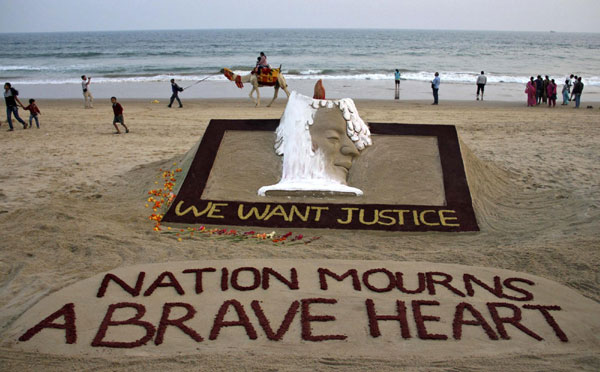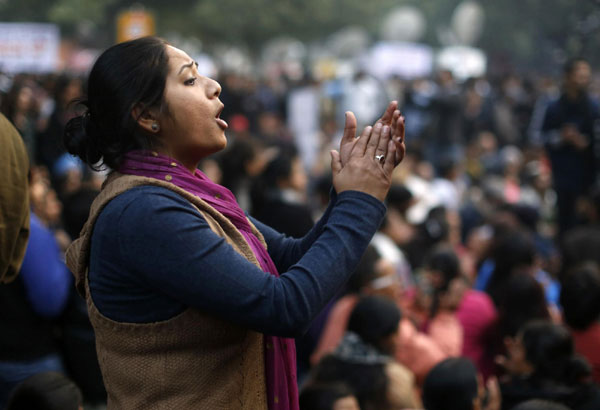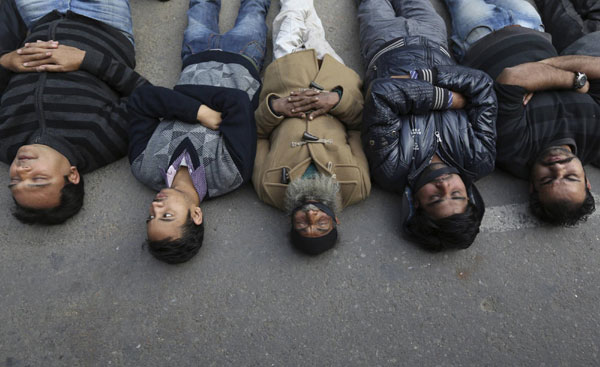|
 |
|
People walk near a sand sculpture with the words "We Want Justice" created by Indian sand artist Sudarshan Patnaik, in solidarity with a gang rape victim who was assaulted in New Delhi, on a beach in the eastern Indian state of Odisha December 29, 2012.??[Photo/Agencies] |
NEW DELHI - The body of a woman whose gang rape provoked protests and rare national debate about violence against women in India arrived back in New Delhi in the early hours of Sunday morning. ? ?
The unidentified 23-year-old medical student died from her injuries on Saturday, prompting promises of action from a government that has struggled to respond to public outrage.
She had suffered brain injuries and massive internal damage in the attack on December 16, and died in hospital in Singapore where she had been taken for treatment.
She and a male friend had been returning home from the cinema, media reports say, when six men on a bus beat them with metal rods and repeatedly raped the woman. The friend survived.
Six suspects were charged with murder after her death.
A Reuters correspondent saw family members who had been with her in Singapore take her body back to their Delhi home in an ambulance with a police escort.
Indian Prime Minister Manmohan Singh's convoy was at the airport when the plane landed and left soon afterwards, the witness said.
The outcry over the attack caught the government off-guard. It took a week for Singh to make a statement, infuriating many protesters.
Issues such as rape, dowry-related deaths and female infanticide rarely enter mainstream political discourse in India.
|
 |
|
A demonstrator shouts slogans during a protest in New Delhi December 29, 2012. A woman whose gang rape provoked protests and a rare national debate about violence against women in India died from her injuries on Saturday, prompting promises of action from government that has struggled to respond to public outrage.??[Photo/Agencies] |
Analysts say the death of the woman dubbed "Amanat", an Urdu word meaning "treasure", by some Indian media could change that, although it is too early to say whether the protesters calling for government action to better safeguard women can sustain their momentum through to national elections due in 2014.
Protest
Protesters have staged peaceful demonstrations in the capital New Delhi and in cities across India in the last few days to keep the pressure on Singh's government to get tougher on crimes against women. Last weekend protesters fought pitched battles with police.
Authorities, worried about the reaction to the news of her death on Saturday, deployed thousands of policemen, closed 10 metro stations and banned vehicles from some main roads in central New Delhi.
Most sex crimes in India go unreported, many offenders go unpunished, and the wheels of justice turn slowly, according to social activists, who say that successive governments have done little to ensure the safety of women.
|
 |
|
Demonstrators lie on a road during a protest in New Delhi December 29, 2012. A woman whose gang rape sparked protests and a national debate about violence against women in India died of her injuries on Saturday, promoting a security lockdown in New Delhi and an acknowledgement from India's prime minister that social change is needed.?[Photo/Agencies] |
Commentators and sociologists say the rape has tapped into a deep well of frustration many Indians feel over what they see as weak governance and poor leadership on social issues.
New Delhi has the highest number of sex crimes among India's major cities, with a rape reported on average every 18 hours, according to police figures. Government data show the number of reported rape cases in India rose by nearly 17 percent between 2007 and 2011.